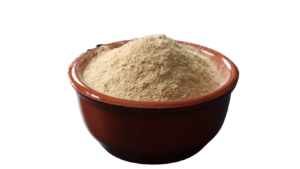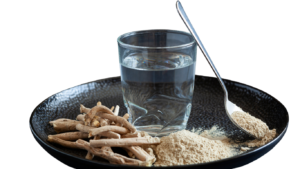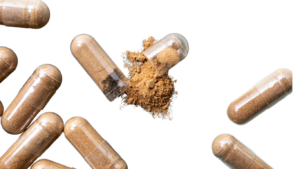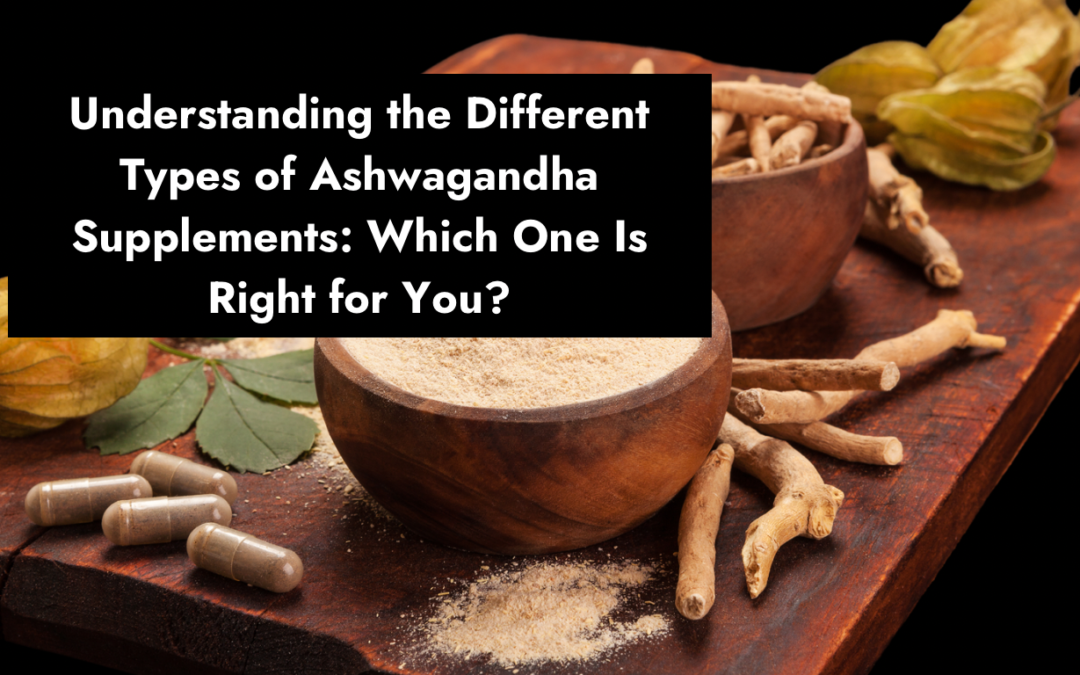Ashwagandha, a powerful adaptogenic herb, has been used for thousands of years in Ayurvedic medicine to promote overall wellness. Its ability to help the body cope with stress, improve energy levels, enhance mental clarity, and support immune function has made it one of the most popular herbal supplements today.
However, with its increasing popularity, a variety of Ashwagandha supplements are now available on the market—each with its own unique properties, benefits, and applications.
In this blog, we’ll explore the different types of Ashwagandha supplements and guide you in choosing the one that best aligns with your health goals.
1. Ashwagandha Root Powder

Ashwagandha root powder is the most traditional and unprocessed form of this adaptogenic herb, offering a natural and holistic approach to the benefits of Ashwagandha.
For centuries, it has been an essential part of Ayurvedic medicine and continues to be widely used in various forms today, especially in its powdered state.
If you’re considering incorporating Ashwagandha root powder into your wellness routine, it’s important to understand its benefits, uses, and potential downsides.
Here’s everything you need to know.
What Is Ashwagandha Root Powder?
Ashwagandha (Withania somnifera) is a plant native to India and parts of Africa, known for its roots, which are packed with medicinal compounds. The root of the Ashwagandha plant contains withanolides, alkaloids, saponins, and flavonoids — all bioactive compounds believed to contribute to the herb’s therapeutic properties.
When processed into powder form, the dried root is finely ground into a powder that retains much of its original nutritional and medicinal content. Ashwagandha root powder is typically sold in loose form, though it can also be found in capsules or other supplement formats.
Key Benefits of Ashwagandha Root Powder

- Reduces Stress and Anxiety
Ashwagandha is primarily known for its adaptogenic properties, meaning it helps the body adapt to stress. Multiple studies have shown that Ashwagandha root powder can significantly reduce levels of cortisol, the body’s main stress hormone, thereby helping to lower overall feelings of anxiety and stress. This can lead to a calmer, more balanced state of mind. - Improves Sleep
One of the most common uses of Ashwagandha root powder is for improving sleep quality. Its calming effects on the nervous system help relax the body and mind, making it easier to fall asleep and stay asleep throughout the night. It is particularly helpful for those who experience stress-related sleep disturbances. - Boosts Energy and Endurance
While Ashwagandha is well-known for its relaxing effects, it can also boost energy and endurance. The herb works by helping the body manage stress, which in turn conserves energy and reduces fatigue. Many people use Ashwagandha root powder to enhance physical performance and stamina, especially when combined with regular exercise. - Supports Immune Function
Ashwagandha is known to enhance the immune system. By reducing inflammation and supporting the body’s natural defense mechanisms, Ashwagandha root powder can help keep the immune system in optimal shape. Regular use of Ashwagandha may reduce susceptibility to illness and improve recovery times from illnesses. - Improves Cognitive Function
Ashwagandha root has been found to support brain health by enhancing memory, concentration, and cognitive processing speed. Some studies suggest that it may also help protect the brain from neurodegenerative diseases like Alzheimer’s by reducing oxidative stress. - Supports Hormonal Balance
Ashwagandha has been shown to help balance thyroid function, making it beneficial for people with both hypothyroidism and hyperthyroidism. It may also support the regulation of other hormones, such as reproductive hormones, making it a useful herb for improving fertility in both men and women. - Anti-Inflammatory and Antioxidant Properties
The active compounds in Ashwagandha, especially withanolides, are known for their potent anti-inflammatory and antioxidant properties. These properties help reduce oxidative stress and inflammation in the body, supporting overall health and reducing the risk of chronic conditions.
How to Use Ashwagandha Root Powder

Ashwagandha root powder is highly versatile and can be consumed in several ways. Here are some common methods of incorporating it into your daily routine:
As a Drink
One of the most popular ways to consume Ashwagandha powder is by mixing it into warm milk or water. In Ayurvedic tradition, it’s often combined with warm milk, honey, or ghee to enhance its calming effects. You can also mix it into a herbal tea or smoothie.
How to Use:
- Mix 1/2 to 1 teaspoon of Ashwagandha root powder in a cup of warm milk or water.
- Stir well and drink once or twice a day, preferably in the evening to help with relaxation.
In Smoothies
For a nutrient-packed boost, add Ashwagandha root powder to your daily smoothie. Its earthy, slightly bitter taste can be masked by other flavorful ingredients like fruits, honey, or cinnamon.
With Other Herbal Supplements
Ashwagandha root powder can be combined with other adaptogenic herbs such as rhodiola, holy basil, or turmeric to create a blend that targets stress reduction, inflammation, or energy levels.
As a Face Mask
Due to its antioxidant and anti-inflammatory properties, Ashwagandha powder can be applied topically to soothe the skin. You can create a simple face mask by mixing Ashwagandha powder with water or yogurt, applying it to your face, and leaving it on for about 15-20 minutes before rinsing off.
Dosage of Ashwagandha Root Powder
The ideal dosage of Ashwagandha root powder can vary based on individual needs and the desired effects. However, the typical dosage ranges from 1/2 teaspoon to 1 teaspoon (about 2-5 grams) per day. For some individuals, higher doses (up to 6 grams) may be used under the guidance of a healthcare provider.
Conclusion: Is Ashwagandha Root Powder Right for You?
Ashwagandha root powder is a versatile and natural supplement that offers a range of health benefits, from reducing stress and anxiety to boosting energy and supporting cognitive function. It is a great choice for those looking for a holistic, all-natural way to improve their well-being, particularly if you prefer a minimally processed supplement.
However, like all supplements, the right choice depends on your specific health goals, lifestyle, and preferences. If you’re looking for a more concentrated or fast-acting form of Ashwagandha, you might prefer a standardized extract or tincture. But if you’re drawn to the idea of a whole-food, unprocessed supplement, Ashwagandha root powder is an excellent option that fits into a variety of wellness routines.
As always, it’s a good idea to consult a healthcare provider before starting any new supplement, especially if you have underlying health conditions or are taking other medications.
2. Ashwagandha Capsules/Tablets

Ashwagandha Capsules/Tablets: A Complete Guide
Ashwagandha capsules and tablets are among the most popular and convenient forms of this potent adaptogenic herb.
These supplements offer a quick, easy way to incorporate Ashwagandha into your daily routine without the need for preparation or mixing. In this guide, we’ll explore the benefits, dosage, potential side effects, and other important factors to consider when choosing Ashwagandha capsules or tablets.
What Are Ashwagandha Capsules/Tablets?
Ashwagandha capsules and tablets are pre-measured doses of either powdered Ashwagandha root or standardized extracts of the herb.
These supplements are typically sold in convenient, easy-to-swallow forms, making them a great option for people who prefer a no-fuss, consistent way to take Ashwagandha.
Some capsules may contain a pure powdered root, while others might be more concentrated, offering a higher dose of active ingredients such as withanolides, the primary bioactive compound in Ashwagandha.
Capsules and tablets are a more refined version of the herb compared to powders, offering controlled dosages and the added convenience of portability. Depending on the brand, Ashwagandha capsules may also contain additional ingredients, such as black pepper (to enhance absorption), or be part of a larger blend of adaptogenic herbs.
Benefits of Ashwagandha Capsules/Tablets

Ashwagandha capsules and tablets offer a wide range of benefits, primarily due to the herb’s adaptogenic and restorative properties. Here are some of the top benefits you can expect from incorporating Ashwagandha into your daily routine:
- Stress Reduction and Anxiety ReliefOne of the most well-known benefits of Ashwagandha is its ability to reduce stress. Studies have shown that Ashwagandha can lower cortisol, the body’s primary stress hormone, which can help reduce feelings of anxiety, stress, and tension. Regular use of Ashwagandha may help you feel more balanced and less reactive to stressors in daily life.
- Improved Sleep Quality
Ashwagandha has a calming effect on the nervous system, making it an excellent choice for improving sleep. Taking Ashwagandha in capsule form may help you relax, fall asleep faster, and experience deeper, more restful sleep. This can be especially beneficial for individuals who suffer from insomnia or sleep disturbances related to stress. - Enhanced Energy and Vitality
Ashwagandha is often used to combat fatigue and increase energy levels. By balancing stress hormones and enhancing adrenal function, Ashwagandha can help improve stamina, reduce fatigue, and increase physical endurance. Many people use it as a natural energy booster, especially for workouts or physically demanding activities. - Cognitive Health and Memory
Ashwagandha has been shown to support brain health, improving memory, concentration, and cognitive function. It may also have neuroprotective effects, potentially helping to prevent cognitive decline as we age. Some studies have suggested that it can enhance mental clarity and improve overall brain function - .Immune System Support
With its antioxidant and anti-inflammatory properties, Ashwagandha helps support the immune system, reducing the risk of illness and boosting the body’s natural defenses. By reducing inflammation and oxidative stress, Ashwagandha can help your immune system function at its best. - Hormonal Balance
Ashwagandha is commonly used to support hormonal balance, especially in regard to thyroid function. It can help regulate thyroid hormones, making it beneficial for those dealing with thyroid imbalances (either hypothyroidism or hyperthyroidism). It is also considered helpful for balancing reproductive hormones in both men and women. - Mood and Mental Well-Being
As an adaptogen, Ashwagandha helps the body adapt to stress and maintain emotional balance. It is sometimes used as a natural remedy for depression and mood swings, promoting an overall sense of well-being and mental clarity. Some studies suggest it may have mild antidepressant effects.
Types of Ashwagandha Capsules/Tablets

Standardized Extracts
Many Ashwagandha capsules contain a standardized extract, which means they have been processed to concentrate specific active ingredients like withanolides. These extracts are often more potent, and the concentration of withanolides is clearly labeled on the packaging (e.g., 5%, 10%, or even higher). Standardized extracts are ideal for those who want a more concentrated, consistent dose of the herb’s active compounds.
Powdered Root
Some capsules may contain powdered Ashwagandha root, which is the whole herb in its natural form, providing a broader range of compounds. While these capsules may not offer the same high potency as standardized extracts, they provide a more holistic, unrefined version of Ashwagandha.
Blends
Ashwagandha capsules are sometimes formulated with additional adaptogens or other beneficial herbs like rhodiola, holy basil, or turmeric. These blends are often marketed for specific purposes such as enhanced energy, improved sleep, or reduced stress. If you’re looking for a comprehensive approach to wellness, a blend may be a good option.
Enhanced Absorption
Some Ashwagandha capsules are combined with black pepper extract (piperine) or other ingredients designed to enhance absorption. This can be particularly beneficial, as Ashwagandha may have low bioavailability on its own, meaning it might not be absorbed as efficiently without such enhancements.
Conclusion: Are Ashwagandha Capsules/Tablets Right for You?
Ashwagandha capsules and tablets are a convenient, effective, and easy-to-dose option for those looking to reap the benefits of this powerful adaptogen. Whether you’re aiming to reduce stress, improve sleep quality, boost energy, or support cognitive health, Ashwagandha capsules provide a straightforward way to incorporate this herb into your routine.
Capsules are an excellent choice for those who prefer a pre-measured, no-prep option and want a more potent, controlled dose. If you’re new to Ashwagandha or want a simple, consistent way to take it, capsules and tablets can be a great fit. Just remember to choose a high-quality product, start with a lower dose, and consult a healthcare provider if you have any concerns or pre-existing conditions.
Ultimately, Ashwagandha capsules offer a simple yet effective way to experience the full spectrum of benefits this ancient herb has to offer.
3. Ashwagandha Extract (Withanolide Concentrates)

What is Ashwagandha Extract?
Ashwagandha extract is a concentrated form of the Ashwagandha herb, typically made from its roots, although the leaves are also sometimes used.
The extraction process involves isolating the active compounds in Ashwagandha—particularly withanolides—which are believed to be responsible for many of its health benefits.
These compounds are present in higher concentrations in the root, making it the most commonly used part of the plant for supplements.
The extract can be found in various forms, such as powders, capsules, tablets, liquid tinctures, and even teas. The potency and bioavailability of Ashwagandha vary depending on the type of extract and the extraction method used.
Health Benefits of Ashwagandha Extract

Ashwagandha extract is widely celebrated for its adaptogenic properties, meaning it helps the body adapt to stress and restore balance. Below are some of the key benefits that Ashwagandha extract may offer:
1. Stress Reduction and Anxiety Relief
Ashwagandha is perhaps best known for its ability to reduce stress and promote a sense of calm. As an adaptogen, it helps regulate cortisol, the body’s primary stress hormone. Elevated cortisol levels can lead to anxiety, insomnia, and other health issues, so managing cortisol is crucial for overall well-being.
- Research: Several clinical studies have demonstrated that Ashwagandha extract significantly reduces cortisol levels and helps alleviate symptoms of stress and anxiety.
- How it Works: Ashwagandha affects the hypothalamic-pituitary-adrenal (HPA) axis, the system responsible for your stress response, thereby helping to modulate the stress response and reduce anxiety.
2. Improved Sleep Quality
Ashwagandha is often used as a natural remedy for insomnia and other sleep disturbances. Its calming and relaxing effects on the nervous system help people fall asleep faster and enjoy deeper, more restful sleep.
- Research: Studies suggest that Ashwagandha supplementation improves sleep quality, reduces insomnia, and even enhances overall sleep time.
- How it Works: By reducing cortisol and calming the nervous system, Ashwagandha promotes relaxation and helps the body transition into a more restful sleep state.
3. Increased Energy and Endurance
Ashwagandha has been shown to boost energy levels, combat fatigue, and improve physical endurance. It helps the body resist physical stress, which is particularly beneficial for athletes and people with high activity levels.
- Research: In clinical trials, Ashwagandha extract has been linked to increased stamina, improved VO2 max (a measure of cardiovascular endurance), and better physical performance.
- How it Works: Ashwagandha helps increase red blood cell production and improve oxygen uptake, both of which can enhance physical performance and reduce feelings of exhaustion.
4. Cognitive Enhancement and Memory Support
Ashwagandha has neuroprotective properties that can improve memory, focus, and overall brain function. Its antioxidant-rich profile protects brain cells from oxidative stress, which may contribute to cognitive decline as we age.
- Research: Studies suggest Ashwagandha can improve memory, attention, and overall cognitive function, making it useful for people dealing with stress-related cognitive decline or those looking to boost mental clarity.
- How it Works: Ashwagandha promotes the production of acetylcholine, a neurotransmitter crucial for memory, and reduces oxidative stress, which can damage brain cells over time.
5. Immune System Support
Ashwagandha is known to enhance immune system function by increasing the production of white blood cells, which play a critical role in fighting infections and illnesses.
- Research: Ashwagandha has been shown to help regulate immune responses, reduce inflammation, and improve the body’s ability to fight off infections.
- How it Works: Withanolides in Ashwagandha modulate the immune system by balancing pro-inflammatory and anti-inflammatory responses, making it a natural immune booster.
6. Hormonal Balance and Thyroid Function
Ashwagandha can support thyroid function, particularly in individuals with hypothyroidism, by stimulating the production of thyroid hormones. It also helps maintain hormonal balance in both men and women.
- Research: Studies suggest Ashwagandha helps normalize thyroid hormone levels, particularly thyroid-stimulating hormone (TSH), which can be helpful for individuals with low thyroid function.
- How it Works: Ashwagandha’s adaptogenic properties support the endocrine system, promoting balanced hormone production and improving metabolic functions.
7. Anti-Inflammatory and Antioxidant Effects
Ashwagandha has potent anti-inflammatory and antioxidant properties, which help reduce inflammation in the body and protect cells from oxidative damage.
- Research: Several studies have shown that Ashwagandha can reduce markers of inflammation and increase antioxidant activity in the body.
- How it Works: Withanolides, alkaloids, and other active compounds in Ashwagandha help inhibit inflammatory pathways and neutralize free radicals, reducing chronic inflammation and protecting tissues from damage.
Types of Ashwagandha Extract

There are several types of Ashwagandha extract available on the market, each with different characteristics. Here are the most common forms:
1. Root Extract
- Most Popular: Ashwagandha root extract is the most commonly used and studied form of the herb. It is rich in withanolides, which provide most of the herb’s therapeutic effects.
- Standardization: Root extracts are often standardized to contain a specific percentage of withanolides, which ensures consistent potency in each dose.
2. Leaf Extract
- Less Common: Ashwagandha leaf extract is less widely used but still offers health benefits. It contains different compounds from the root and is often used for its immune-boosting and anti-inflammatory effects.
- Standardization: Leaf extracts may not be standardized as often as root extracts, but they still provide powerful antioxidant properties.
3. KSM-66® Ashwagandha
- Full-Spectrum Extract: KSM-66® is a patented, full-spectrum root extract known for its high concentration of withanolides (typically around 5%).
- Benefits: It’s been extensively studied for its stress-relieving, energy-boosting, and cognitive-enhancing effects, making it a top choice for many consumers.
- Production Process: KSM-66® is extracted using a unique, water-based process that preserves the full spectrum of beneficial compounds in the root, without the use of alcohol or chemical solvents.
4. Sensoril® Ashwagandha
- Highly Standardized Extract: Sensoril® is another well-known branded form of Ashwagandha. It’s highly standardized (containing 10% withanolides) and is particularly effective for reducing stress and promoting relaxation.
- Benefits: Sensoril® is often used for its calming effects and is considered a potent choice for managing anxiety and improving sleep.
How to Choose the Best Ashwagandha Extract
When selecting an Ashwagandha extract, it’s important to consider factors like your health goals, preferred form, dosage, and the quality of the supplement. Here are some tips for choosing the right Ashwagandha extract for you:
1. Consider Your Health Goals
- For Stress and Anxiety: Choose a root extract standardized to a high percentage of withanolides, such as KSM-66® or Sensoril®.
- For Sleep and Relaxation: Look for supplements with additional calming herbs (like L-theanine or magnesium) or opt for a full-spectrum Ashwagandha extract.
- For Energy and Endurance: If you’re an athlete or someone looking to boost stamina, KSM-66® or other high-potency root extracts are excellent options.
2. Choose the Right Form
- Capsules/Tablets: Convenient and easy to dose, but may take longer to show effects.
- Powder: Ideal for those who want to customize their dosage and mix Ashwagandha into smoothies or teas.
- Liquid Extracts/Tinctures: Fast-absorbing and easy to adjust the dosage.
- Teas: Provide a gentle effect, but may have a lower concentration of active ingredients.
3. Check the Standardization
- Look for standardized extracts that ensure consistent potency and quality. For instance, KSM-66® and Sensoril® are popular for their high withanolide content and scientific backing.
4. Look for Quality and Purity
- Choose products from reputable brands that provide third-party testing or certifications for purity and potency. Organic or non-GMO certifications are also important for ensuring the product is of high quality.
Conclusion
Ultimately, the best Ashwagandha supplement is one that fits seamlessly into your routine and addresses your unique needs. As always, it’s a good idea to consult with a healthcare provider before starting any new supplement regimen, especially if you have underlying health conditions or are taking medications.

